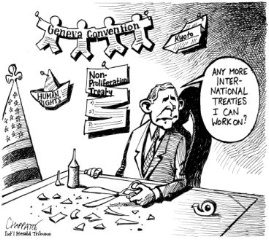Above Us, the Law, and Democracy (Whose Side Are They On)?
 Behind the Bipartisan Drive Toward War in Iraq: The Council on Foreign Relations
Behind the Bipartisan Drive Toward War in Iraq: The Council on Foreign Relationsby Larry Shoup
Behind the Bipartisan Drive Toward War in Iraq: The Council on Foreign Relations
Media coverage and the public debate about the threat of United States war on Iraq has focused almost exclusively on the role of the Bush administration with little awareness or coverage of the wider consensus within powerful upper class U.S. groups to attack and control Saddam Hussein’s Iraq. Nor has there been much coverage about the larger imperial goal of reforming the political economy of the Middle East.
 CFR’s Drive for a War on Iraq
CFR’s Drive for a War on Iraq September 11, 2001 sparked in a new burst of CFR activity to plan yet another “new world order.” Kenneth M. Pollack, the CFR’s Director National Security Studies. wrote an article for the Foreign Affairs magazine entitled “Next Stop Baghdad?” and a book, The Threatening Storm: The Case for Invading Iraq in October 2002. An expert on Iraq, Iran and the Persian Gulf, Pollack is a Yale and MIT graduate who has worked for the CIA, the National Security Council under Bill Clinton and George W. Bush, and also has been a research professor at the National Defense University. A review of the book in Foreign Affairs called it “exceptionally thoughtful. If any book can shape the current thinking on
, this one will assuredly be it.”
 In the months after September 11, Pollack and other CFR scholars wrote about 100 op-ed articles in major national and international newspapers, 20 major journal articles, and a total of ten books. CFR members made over 1,000 appearances as commentators on radio and TV shows, testified before Congress, and gave briefings to key governmental officials, including, in the words of the CFR Annual Report, special briefings for members of President Bush’s inner circle.
In the months after September 11, Pollack and other CFR scholars wrote about 100 op-ed articles in major national and international newspapers, 20 major journal articles, and a total of ten books. CFR members made over 1,000 appearances as commentators on radio and TV shows, testified before Congress, and gave briefings to key governmental officials, including, in the words of the CFR Annual Report, special briefings for members of President Bush’s inner circle.In addition, a “vigorous public diplomacy campaign” is seen a necessary to convince skeptical publics at home and abroad that U.S. objectives and intentions are just. In this regard the
Guiding Principles report states:
“One of the most important issues to address is the widely held view that the campaign against Iraq is driven by an American wish to ‘steal’ or at least control Iraqi oil. U.S. statements and behavior must refute this... A heavy American hand will only convince them and the world that the operation against Iraq was undertaken for imperialist, rather than disarmament, reasons.”
 Yet the body of the report has a section called “The Lure of Oil: Realities and Constraints,” as well as an addendum called “Oil and Iraq: Opportunities and Challenges,” which is almost as long as all of the rest of the report text. In the sections focusing on oil, lip service is given to Iraq’s control of its own oil, while, in fact, the report argues that national control of Iraqi oil must be scrapped and an “economy based on free market principles” and a “level playing field for all international players to participate” be created. The report goes on to point out:
Yet the body of the report has a section called “The Lure of Oil: Realities and Constraints,” as well as an addendum called “Oil and Iraq: Opportunities and Challenges,” which is almost as long as all of the rest of the report text. In the sections focusing on oil, lip service is given to Iraq’s control of its own oil, while, in fact, the report argues that national control of Iraqi oil must be scrapped and an “economy based on free market principles” and a “level playing field for all international players to participate” be created. The report goes on to point out:“Paragraph 30 of UNSCR 1284 already authorizes the UN secretary-general to investigate ways that oil companies could be allowed to invest in Iraq. Thus, the legal basis for the UN to authorize and oversee foreign investment... already exists.”
The report also makes clear that the Iraqi oil contracts that French and Russian companies now have will be challenged:

And Now a Word from CFR’s Corporate Sponsors:
The Council on Foreign Relations list of leading corporate benefactors in recent years include ABC, AOL Time Warner, American Express, Aramco, ATT, British Petroleum, Bristol-Myers Squibb, Chevron Texaco, Citigroup, Corning, Deutsche Bank AG, Exxon Mobil, Federal Express, J.P. Morgan Chase, Lockheed Martin, Metropolitan Life Insurance, Morgan Stanley, Nike, Pfizer, Pricewaterhouse Coopers, Prudential Financial, Shell Oil, Sony, Toyota, UBS Paine Webber, Verizon Communications and Xerox.
Arrogance of a Super Power: the Bush Administration and CFR Goals
Given the close interlocks of personnel between the CFR and the U.S. government and the bipartisan nature of the CFR, it should come as no surprise that CFR views are clearly reflected both in the Bush administration’s foreign policies and the policy positions taken by leading Democrats in the House and Senate. The majority of Democratic Senators voted for authorizing President Bush to go to war preemptively against Iraq at his own discretion, and Democratic presidential candidates are almost all pro-war.
The animating vision for the CFR/Bush administration’s foreign policy is for a global empire/Pax Americana, extending the existing policeman of the world role to becoming hegemon as well. This view is reflected in the September 2002 Bush administration document “National Security Strategy of the United States.” This official document discounts the importance of a variety of international treaties, including nuclear nonproliferation, in favor of unilateral U.S. actions under the doctrine of “counter-proliferation,” meaning missile defense, and preemptive attacks on countries perceived to be a threat to the United States. The words of the document follow the CFR ideas on pre-emptive attacks discussed above: “we will not hesitate to act alone, if necessary, to exercise our right of self-defense by acting preemptively... {including} convincing or compelling states to accept their sovereign responsibilities.” The result is that the United States is on the verge of starting a major war as the aggressor. ...
Beyond the injustice, suffering and terrorism that corporate globalization creates, there are dangers posed by the new preemptive imperialism of the CFR, Bush administration, and their supporters in the Republican and Democratic parties. In the past, when one nation unilaterally seized the role of setting international norms and standards, determined what threats existed, preemptively made war, and claimed absolute sovereignty for itself, sooner or later that nation has had a serious price to pay. Any nation deciding upon such a perilous course is likely to be heading for a fall because its actions tend to trigger antagonism and resistance, eventually creating a hostile world united against it. Thus encirclement awaits any nation which consistently ignores the interests of others.
http://www.cagreens.org/greenfocus/CFR.html
So while we are holding the feet of the newly elected congress to the fire, let's watch the lobbyists who visit them, and investigate just how much power the CFR has in the day to day decisions of the people's house of elected representatives.


0 Comments:
Post a Comment
<< Home